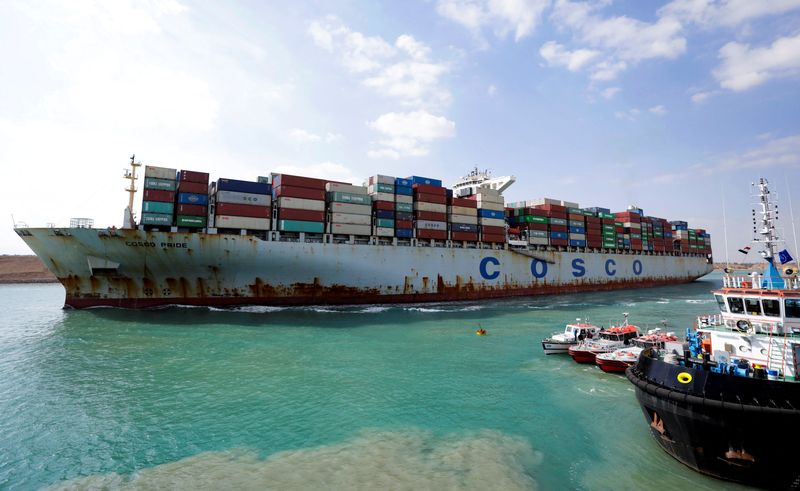By Howard Schneider and Balazs Koranyi
WASHINGTON (Reuters) - Global central banks hoping that high inflation would ease through improving global supply chains saw little relief through April as new coronavirus lockdowns in China and the war in Ukraine lengthened delivery times and drove costs higher, new analyses from the New York Federal Reserve and others indicates.
A global supply chain pressure index, released on Wednesday by the New York Fed, rose in April after four months in which supply troubles appeared to ease, a reversal that, if continued, potentially means more persistent inflation even as central banks move to control rising prices.
Graphic: Supply conditions worsen https://graphics.reuters.com/USA-ECONOMY/SUPPLY/byprjdlxgpe/chart.png
The April index, combining an array of statistics on global transport costs, delivery times, and other data, "suggests that the moderation we have observed in recent months has been partially reversed, as lockdown measures in China and geopolitical developments are putting further strains on delivery times and transportation costs in China and the euro area," a team of New York Fed economists wrote.
An Oxford Economics index of U.S. supply problems did ease last month, but the improvement masked a drop-off in goods arriving from China - a factor that helped relieve shortages in the trucking industry.
A Morning Consult poll found large numbers of U.S. consumers reported that either goods were unavailable or harder to find in April, or that delivery times for products ordered online had slowed. About 60% of grocery shoppers reported "difficulty finding certain items," and 40% said deliveries of home improvement goods had slowed, the poll https://go.morningconsult.com/rs/850-TAA-511/images/Supply-Chains-Inflation-Report-May-2022.pdf showed.
Graphic: Oxford Economics U.S. supply chain tracker https://graphics.reuters.com/USA-ECONOMY/SUPPLY/gkvlgzwajpb/chart.png
"Supply chain conditions remained highly strained in April ... Challenges within logistics eased ... but we take this reading with a grain of salt since the improvement was partly artificial as China's lockdowns slowed trade flows at U.S. ports and weighed on business activity," wrote Oren Klachkin, lead U.S. economist at Oxford.
OUT OF WHACK
The Fed and other major central banks are already raising interest rates or laying plans to do so in an effort to curb inflation running far above the 2% target that has become the norm for monetary policy in the world's major developed economies.
Graphic: Inflation becomes a common risk https://graphics.reuters.com/GLOBAL-ECONOMY/CENBANKS/gkvlgazoqpb/chart.png
The hope is to lower demand for goods and services, as higher interest rates discourage homebuying and other major purchases, and in doing so to "get supply and demand ... back together," Fed Chair Jerome Powell said on Tuesday.
The two have been out of whack throughout the pandemic, particularly in the United States where trillions of dollars in COVID-related federal spending and transfer payments left households, firms, and local governments with money to use even as world supply chains sputtered through waves of infections and lockdowns - and now a war in Europe.
But policymakers are also hoping, as Powell said, to "give the supply side a chance to catch up and a chance for inflation to come down" of its own accord as goods begin to flow more easily around the world.
How much and how fast that happens, however, has become both more uncertain, and increasingly important to the pace of rate hikes that central banks may need to impose and the ultimate level of interest rates required to rein in inflation. The more global supply remains constrained, the stricter central banks may have to be in their efforts to curb demand, growth, and potentially employment.
There are immediate concerns based on acute problems, a shortage of truckers in Europe, for example, driven by Russia's invasion of Ukraine.
"Shortages in Europe's transport sector may become more severe because many Ukrainian and Russian drivers are no longer available to work," Isabel Schnabel, a member of the European Central Bank's executive board, said last week.
Over a longer time frame, the possibility of a more regionalized world economy, cut into smaller geopolitical zones, might mean a costly and long adjustment to a higher-price world.
"There is a real possibility that globalization will go into reverse to some extent," Powell said. Even though local industries would adapt over time, "it would be a very different world" than the one which produced roughly 30 years in which prices increased slowly on the whole.
The situation has thrown a particular focus on whether China's strict COVID containment policies will be relaxed and, if so, how fast the country's output of manufactured goods and industrial products can recover.
China Beige Book, a data and analytics firm focused on the country, said in a note last week that backlogs were likely to worsen, potentially causing the Chinese economy to contract in the second quarter of the year and possibly causing U.S. inflation to rise rather than peak in coming weeks.
Noting that Chinese ports "are seeing near-historic levels of backlog," the firm wrote that "if supply chain backlogs from China cause a second wave of surging prices in the U.S. into early summer, then the Fed will be completely pinned down in terms of what it can do."
The lockdowns in China "look like they are impeding the production and flow of goods and services, given how extensive they are, and compounding supply chain difficulties that we have had that have boosted prices," U.S. Treasury Secretary Janet Yellen said on Wednesday at a news conference in Bonn, where she will be meeting with top finance officials from the Group of Seven leading developed economies.
"China's economic performance really has spillover impacts on growth all around the world," Yellen added.
